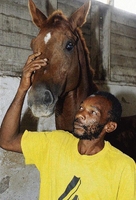Grooms: Uncredited foot soldiers in racing - Unsung heroes in horse racing
Published: Monday | December 14, 2009

Veteran groom Rupert Thomas with one of the horses under his control. - Norman Grindley/Chief Photographer
THE RECENT controversy surrounding the introduction of Sunday racing has put the 'Sport of Kings' back in the spotlight.
Owners, trainers, punters, jockeys and administrators have all been given their additional minute of fame as the dispute rages over whether or not the country should have Sunday racing.
However, some key stakeholders have kept out of the debate, quietly doing the work that is absolutely necessary for the horses to take to the track on a Saturday, Wednesday or Sunday.
Most important
The grooms have kept quiet in this debate even though they have been repeatedly described as the, "unsung heroes of the racing game".
"The grooms are probably the most important people in the business," veteran horse racing administrator and director of Caymanas Track Limited, Chris Armond, told The Gleaner.
"They spend the majority of their days looking after the animals. They spend more time with the horses than the owners, the trainers, the exercise riders and the jockeys," Armond added.
But after 30 years in the business, veteran groom Vincent Rattigan believes they are not getting their just reward.
"A we down a the bottom of the thing. We get all the dish and the dirt and we a the last to get anything. Even if a horse win, while we get our share of the purse, we no get no reward while the jockey, who only come round the horse one time, you fi see the big gift that the boss give him," Rattigan said.
"And a we deh yah seven days a week, 365 days a year looking after the horse dem," added Rattigan.
His colleague Rupert Thomas has been in the racing game for 27 years and has been a groom for all of that time.
"Me look after the horse like you would look after a little baby. Me bathe them, groom them and just take care of them," Thomas told The Gleaner.
His days begin at about four in the morning and end late at night when he is satisfied that his charges are okay.
"I know them just like how I would know you. I can see them from far and tell you is which horse that," added Thomas.
He said over the years the horses under his care have shown him signs when they are not well.
"Like when you feed them a morning time, dem no eat no food and dem no touch the grass, that mean them not well. When dem belly a hurt them you will see dem paw the ground and a roll, that mean say dem belly no right," said Thomas.
At odds with jockeys
He noted that it was part of the role of the groom to tell the trainer when the horse is not well and needs to see a veterinarian.
But, he continues, while the trainers will listen, it is often a different story with the jockeys.
"We can talk to dem when dem jump up on the horse but, no matter what we say to them, is only the trainer dem listen. Most time dem just do what dem want in the race."
Thomas now works for trainer Donavon Raymond, after serving under Fitzgerald Crawford who took him into the racing game and taught him the ropes.
He joins his fellow grooms in arguing that, "if racing is the sport of kings, then we are the foot soldiers, well needed but not appreciated".
arthur.hall@gleanerjm.com
'





















